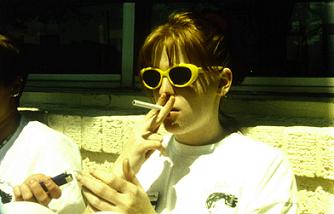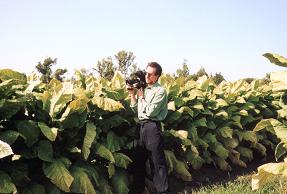

Bright Leaves, by Harvard-based documentarian Ross McElwee (Six O'Clock News, Time Indefinite) is as much about himself as it is about the North Carolina tobacco industry, or the Gary Cooper/Lauren Bacall 1950 film Bright Leaf. By no means does he insert himself shamelessly into the story as some other filmmakers do, but instead he allows his story and the documentary to intertwine fluidly. Because of his family roots, exploring the history of tobacco industry in North Carolina becomes a search for his identity. McElwee is a film professor, and he compulsively films everything. His family was originally from North Carolina, and he often took his wife and son back for summer family reunions. On a trip back, he connected with his second cousin, a rabid film fan, who showed his the film Bright Leaf.
McElwee's great-grandfather John McElwee was a tobacco baron, who developed the "Bull Durham" brand but later lost all of his money in litigation to Washington Duke, the same Duke name behind Duke University. The general consensus in the McElwee family is that Duke had more money. McElwee won initially, but Duke won on appeal. In the intervening years, the Duke family made a fortune, while the McElwee family faded into obscurity (in historical terms of course). McElwee wonders what would have happened if his family, rather than the Dukes, made the money. The plot of Bright Leaf bears what he thinks is a more than coincidental resemblance to the story of McElwee and Duke, and he sets off to discover if indeed the film was based on his great-grandfather.
McElwee is an easygoing guy with a self-deprecating sense of humor. His narration style is low-key, almost monotone at times, but one gets the feeling he is sitting there in the room narrating the story. Although his inflection doesn't vary by much, he is nowhere near boring. He is simple, straightforward, and easily conveys his ideas. He spends part of Bright Leaves traveling around North Carolina, looking into what may have been. It's amusing to watch him think about how different his life would be if his family did have millions. He tours old buildings owned by his great-grandfather, and compares and contrasts them with Duke buildings. He also talks to various people in order to get a better sense of who his grandfather was. It's pretty lighthearted at first, but then McElwee focuses more on the health risks of tobacco, which still generates a lot of business in North Carolina, Bright Leaves takes a slightly darker turn.
He wrestles with feelings of responsibility. Since his great-grandfather sold tobacco products, does that make his family indirectly responsible for many of the deaths and illnesses directly related to tobacco products? If the McElwee's did retain their fortune, would this be a lot worse? What's particularly interesting about Bright Leaves is that at a glance, it seems kind of random. McElwee goes off on a number of tangents, including pieces on his father, brother and son. Things slowly coalesce together, as all the strands of the documentary eventually wend their way to a theme of legacy. How did people remember his great-grandfather? Obviously, they didn't. If he were famous, would he be famous for growing tobacco, a killer of millions? His father and brother are doctors, who undoubtedly will leave better legacies. McElwee wants to instill in his son a sense of what is important in life, and hopes that he is listening (his son is about to enter adolescence after all). These elements make it superficially similar to Divan, another recent documentary about the search for one's past.